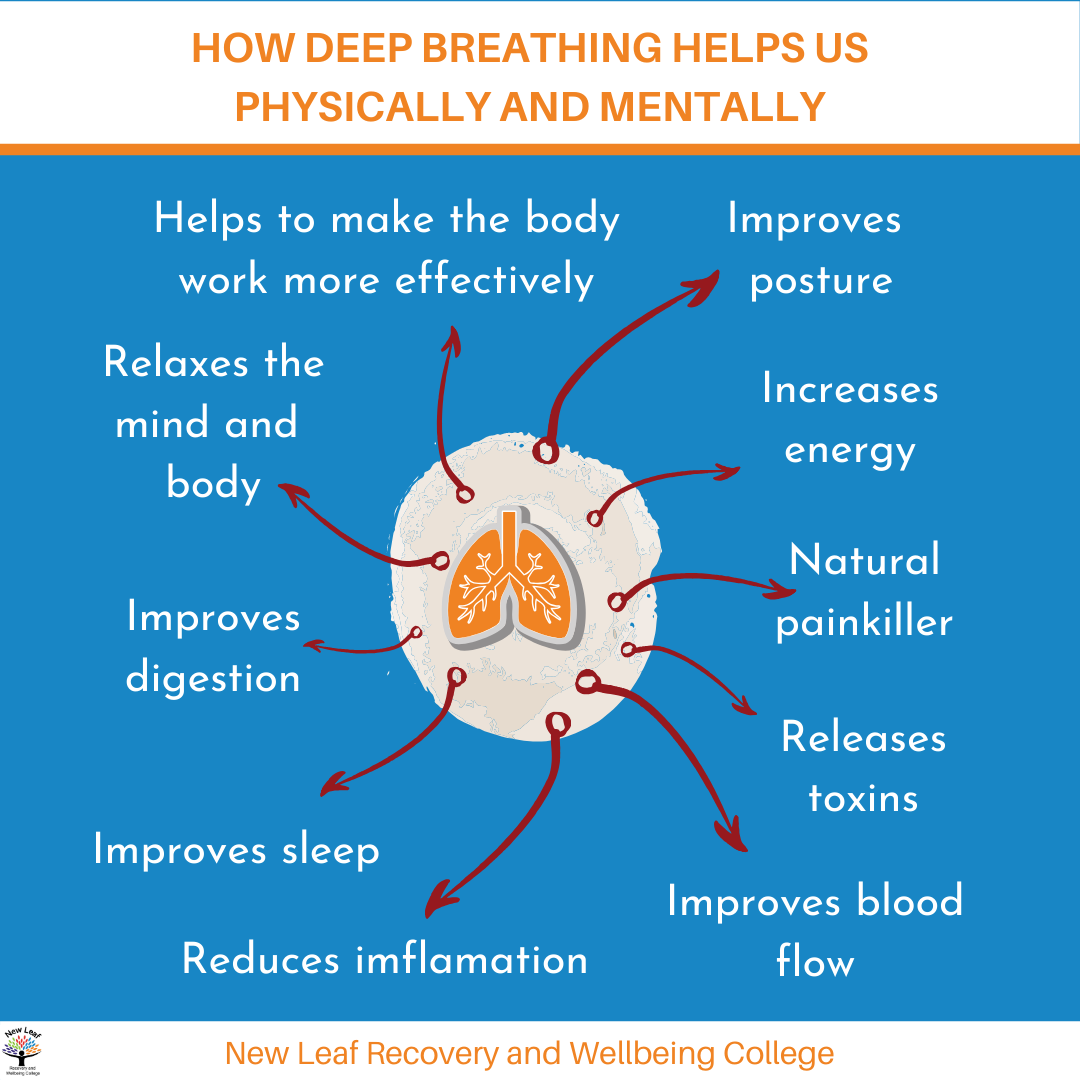Did you know that taking a deep breath has more benefits for our mental and physical wellbeing than just slowing our heart rate? We've dug up some research and found it can help digestion, posture, sleep, stress and more! Take a look to find out more and watch our stress busting guided breathing exercise video!
How to do breathing exercises:
Research concludes that completing deep breathing exercises on a regular basis will help our overall physical and mental wellbeing.
Exercises can vary and can be found on mindfulness apps, books, YouTube and across the web.
It’s important to find what works for you; and our relaxing guided breathing exercise in the video below has been especially selected and delivered by one of our tutors for its simplicity, and to lower stress quickly with its accompanying calming nature imagery.
How does deep breathing help our mental wellbeing?
During panic attacks, emergencies and times we feel anxious, upset or angry, our breathing patterns can change. For example, we may take shallow rapid breaths and begin to feel dizzy, numb, confused and tense or short of breath.
In addition, stress affects our health such as by increasing blood pressure. Gastroenterologist Sarah Kinsinger also discusses how the “fight or flight” response can cause blood to move from the gut to the larger muscles; and this can increase inflammation, interfere with digestion and weaken the immune system.
By breathing slower, and from our lower lungs or abdomen (sometimes called belly breathing), we signal to our brains that we are safe. Tricking the mind into feeling calm then sends signals to our body, which results in the body psychically relaxing; observed by slowing of our breath, a reduced heart rate and decreased muscle tension. As such, the calmness and focus we feel by doing these breathing exercises can make us feel less stressed, anxious and can even help us to drift off to sleep. In addition, the increase in oxygen helps to clear our mind; similarly to how meditations and breaks at work help, deep breathing can improve problem solving and performance by allowing us to refocus.

How does deep breathing help us physically?
Breathing exercises help with pain by increasing endorphins and offering a distraction when focusing on the exercises.
According to therapist Andrea Watkins on Urbanunbalance.com,,psychically relaxing the body will also reduce blood pressure by dilating blood vesicles and improving circulation. In addition, the natural lengthening and straightening of our spines during the exercise will help with posture.
As said by expand-a-lung.com, oxygen helps the body absorb vitamins, nutrients and minerals, which aids digestion, regulates hormones and helps the body to run more efficiently too. Conversely, exhaling eliminates waste and toxins in the form of carbon dioxide, improving functionality.
References and other breathing exercises:
Take a peek at the following references for more information and additional breathing exercises.
- MICHIGAN MEDICINE, UNIVERSITY OF MICHIGAN, UofMHealth.org, [online] University of Michigan 15th of December 2019, viewed 27th of May 2020, Available at: https://www.uofmhealth.org/health-library/uz2255
- SLEEP FOUNDATION, SleepFoundation.org [online] National Sleep Foundation, 2020, viewed 27th of May 2020, Available at: https://www.sleepfoundation.org/articles/relaxation-exercises-falling-asleep
- NHS, nhs.uk [online] Department of Health, 18 September 2018, Viewed 27th of May 2020, Available at: https://www.nhs.uk/conditions/stress-anxiety-depression/ways-relieve-stress/
- ANXIETIES.COM, Anxieties.com [online] GoDaddy.com, 5th January 2020, viewed 27th May 2020, Available at: https://www.anxieties.com/57/panic-step4
- LONDON PAIN CLINIC, LondonPainClinic.com [online] Tucows Domains Inc, 2nd of March 2020, viewed 27th of May 2020, Available at: https://www.londonpainclinic.com/resources/diaphragmatic-breathing-and-chronic-pain/
- SARAH KINSINGER, PHD, Loyalamedicine.org, [online] Deborah Simpkins, 2020, viewed 27th of May 2020, Available at: https://www.loyolamedicine.org/blog/breathing-stress-improve-digestive
- EXPAND A LUNG, Expand a lung.org, [online] FastDomain Inc, 22nd of February 2017, viewed 27th of May 2020, Available at: https://expand-a-lung.com/how-to-breathe-deeply-to-detox-the-body/
- EUGENE-OR.GOV, (2013) Diaphagmatic_breathing , [PDF File] Eugene, city of Eugene, Oregan, p1-2, Available at: https://www.eugene-or.gov/DocumentCenter/View/14142/Diaphagmatic_breathing?bidId=